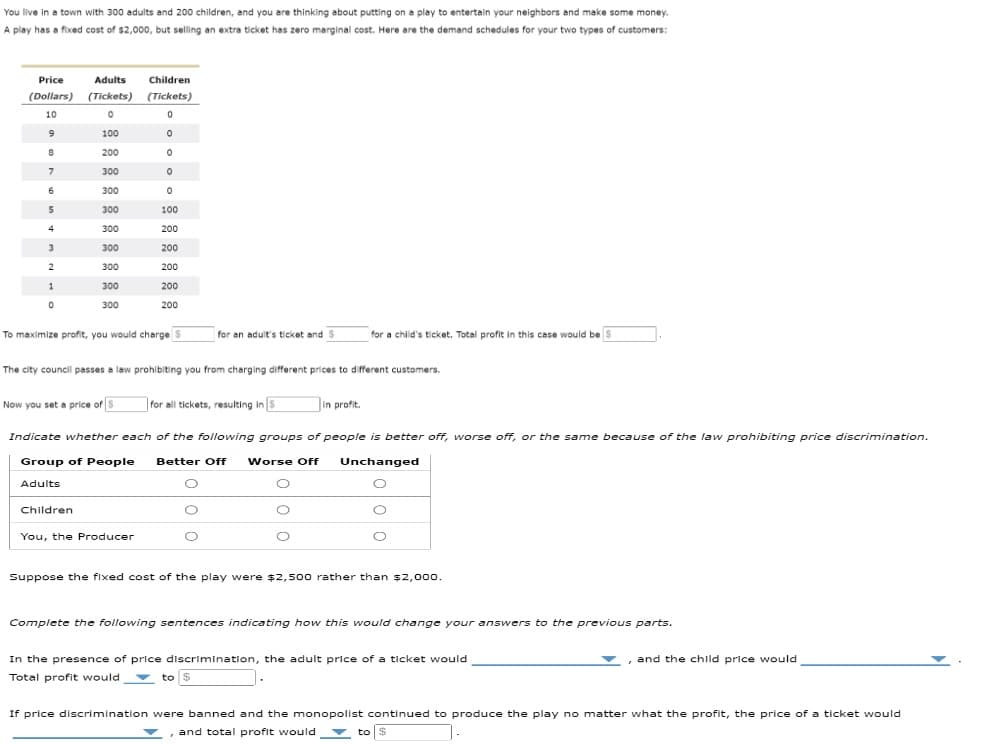You live in a town with 300 adults and 200 children, and you are thinking about putting on a play to entertain your neighbors and make some money. A play has a fixed cost of $2,000, but selling an extra ticket has zero marginal cost. Here are the demand schedules for your two types of customers: Adults Price Children (Dollars) (Tickets) (Tickets) 10 ° ° 9 100 о 200 7 300 о 6 300 о 5 300 100 4 300 200 3 300 200 2 300 200 1 300 200 0 300 200 To maximize profit, you would charge $ for an adult's ticket and $ for a child's ticket. Total profit in this case would be The city council passes a law prohibiting you from charging different prices to different customers. Now you set a price of S for all tickets, resulting in S in profit. Indicate whether each of the following groups of people is better off, worse off, or the same because of the law prohibiting price discrimination. Group of People Better Off Worse Off Unchanged Adults Children You, the Producer Suppose the fixed cost of the play were $2,500 rather than $2,000. Complete the following sentences indicating how this would change your answers to the previous parts. In the presence of price discrimination, the adult price of a ticket would Total profit would to $ ' and the child price would If price discrimination were banned and the monopolist continued to produce the play no matter what the profit, the price of a ticket would and total profit would to $
You live in a town with 300 adults and 200 children, and you are thinking about putting on a play to entertain your neighbors and make some money. A play has a fixed cost of $2,000, but selling an extra ticket has zero marginal cost. Here are the demand schedules for your two types of customers: Adults Price Children (Dollars) (Tickets) (Tickets) 10 ° ° 9 100 о 200 7 300 о 6 300 о 5 300 100 4 300 200 3 300 200 2 300 200 1 300 200 0 300 200 To maximize profit, you would charge $ for an adult's ticket and $ for a child's ticket. Total profit in this case would be The city council passes a law prohibiting you from charging different prices to different customers. Now you set a price of S for all tickets, resulting in S in profit. Indicate whether each of the following groups of people is better off, worse off, or the same because of the law prohibiting price discrimination. Group of People Better Off Worse Off Unchanged Adults Children You, the Producer Suppose the fixed cost of the play were $2,500 rather than $2,000. Complete the following sentences indicating how this would change your answers to the previous parts. In the presence of price discrimination, the adult price of a ticket would Total profit would to $ ' and the child price would If price discrimination were banned and the monopolist continued to produce the play no matter what the profit, the price of a ticket would and total profit would to $
Chapter2: Using Economics To Study Health Issues
Section: Chapter Questions
Problem 1QAP
Related questions
Question
Please check the answer and add explanation properly for all parts

Transcribed Image Text:You live in a town with 300 adults and 200 children, and you are thinking about putting on a play to entertain your neighbors and make some money.
A play has a fixed cost of $2,000, but selling an extra ticket has zero marginal cost. Here are the demand schedules for your two types of customers:
Adults
Price
Children
(Dollars) (Tickets) (Tickets)
10
°
°
9
100
о
200
7
300
о
6
300
о
5
300
100
4
300
200
3
300
200
2
300
200
1
300
200
0
300
200
To maximize profit, you would charge $
for an adult's ticket and $
for a child's ticket. Total profit in this case would be
The city council passes a law prohibiting you from charging different prices to different customers.
Now you set a price of S
for all tickets, resulting in S
in profit.
Indicate whether each of the following groups of people is better off, worse off, or the same because of the law prohibiting price discrimination.
Group of People Better Off Worse Off Unchanged
Adults
Children
You, the Producer
Suppose the fixed cost of the play were $2,500 rather than $2,000.
Complete the following sentences indicating how this would change your answers to the previous parts.
In the presence of price discrimination, the adult price of a ticket would
Total profit would
to $
'
and the child price would
If price discrimination were banned and the monopolist continued to produce the play no matter what the profit, the price of a ticket would
and total profit would
to $
Expert Solution
This question has been solved!
Explore an expertly crafted, step-by-step solution for a thorough understanding of key concepts.
This is a popular solution!
Trending now
This is a popular solution!
Step by step
Solved in 2 steps

Recommended textbooks for you


Managerial Economics: A Problem Solving Approach
Economics
ISBN:
9781337106665
Author:
Luke M. Froeb, Brian T. McCann, Michael R. Ward, Mike Shor
Publisher:
Cengage Learning



Managerial Economics: A Problem Solving Approach
Economics
ISBN:
9781337106665
Author:
Luke M. Froeb, Brian T. McCann, Michael R. Ward, Mike Shor
Publisher:
Cengage Learning
